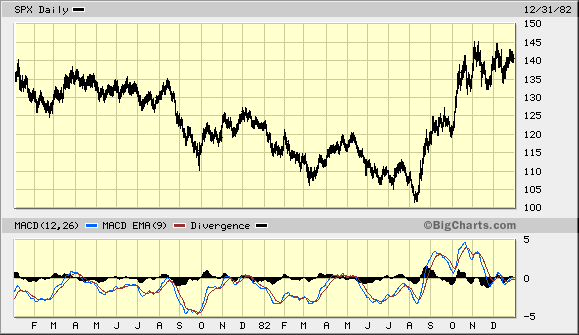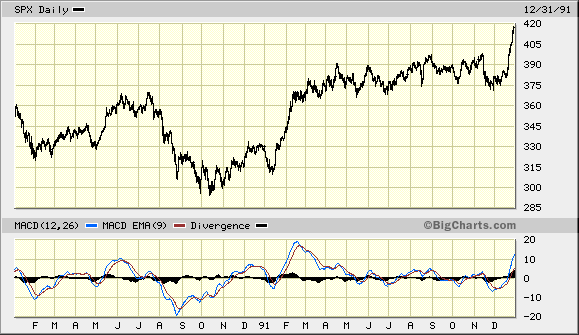Stock Market the Best Indicator for Economic Recovery 2010
Stock-Markets / Economic Recovery Jan 01, 2010 - 12:58 AM GMTBy: Clif_Droke
 With the commencement of a New Year comes the usual barrage of analyst predictions for what the year ahead will look like. This is the time when economists present their year-ahead forecasts and when investors anxiously contemplate what the next 12 months will hold in store for them.
With the commencement of a New Year comes the usual barrage of analyst predictions for what the year ahead will look like. This is the time when economists present their year-ahead forecasts and when investors anxiously contemplate what the next 12 months will hold in store for them.
After two years of recession, most observers aren’t exactly brimming with enthusiasm over the economic prospects for 2010. Most in fact are downright dejected over the 2010 outlook. Investors are daily deluged with a plethora of negative economic forecasts for 2010, most of which are simple linear extrapolations of the prevailing economic trend of the past two years.
Keeping in mind that the art of economic forecasting consists mainly in projecting today’s headlines into tomorrow, we’ll conveniently sidestep this all-too-common pitfall and look to a more reliable method for guessing what lies ahead. At the end of the day economic forecasting is nothing more than anyone’s best “guesstimate” since no one ultimately knows what the future holds. The best economist is the one that has a history of being mostly correct and is therefore the best guesser.
To what or whom does this enviable distinction belong? Why none other than the stock market, which has an unrivalled history of accurately predicting reversals in the economy. Not for naught has the market been called the “ultimate barometer of business conditions” and the “ultimate economic forecasting tool.”
For all the doom-and-gloomers out there who profess to be Dow Theorists, most of them seem blithely unaware that one of the most basic tenets of the theory as propounded by Charles Dow and Robert Rhea. In the seminal book entitled, “The Dow Theory” by Robert Rhea we learn that “The averages discount everything.” He continues:
“The fluctuations of the daily closing prices of the Dow Jones rail and industrial averages afford a composite index of all the hopes, disappointments, and knowledge of everyone who knows anything of financial matters, and for that reason the effects of coming events (excluding acts of God) are always properly anticipated in their movement.”
Rhea further observed that “consciously or unconsciously, the movement of prices reflects not the past but the future.” Rhea explained that the market doesn’t trade on what everybody knows, but on what those with the best information can foresee. As Rhea put it, “There is an explanation for every stock movement somewhere in the future.”
With this in mind, the extraordinary 10-month rally in the major averages in 2009 can be seen from a Dow Theory perspective to hold a positive implication for business conditions in the foreseeable future. The market sees something it likes and the reality of what the market sees will eventually become plain and clear in to all in due time.
The arguments in favor of a continuation or worsening of the recession are unlimited. A discussion of these arguments would be superfluous, however, since they are too well known to merit repetition. In this instance perhaps Rhea said it best when he wrote, “It may almost be said that a bear argument understood is a bear argument discounted.”
It’s always helpful to look back at previous instances when the major averages correctly discounted the economy’s future outlook. The economic recession of 1982, for instance, was similar to the one of 2007-2009 in that the Dow and S&P 500 topped out at about the same time the economy turned down. The top for the broad market was in late 1981 and the chart of the S&P shows the downward trajectory the market commenced in December ’81 and continuing through August 1982. A sharp reversal in the S&P beginning in August ’82 heralded the end of the recession, although the improvement in the economy didn’t become immediately apparent until the following year.

An even better example of how the market tends to discount changes in business conditions is afforded by the 1990-1991 experience. The economy topped out in 1990 and by ’91 was in the throes of recession. All through 1991 the mainstream press relentless harped on the sad state of the economy, all the while ignoring the clear message of the stock market, which was shouting, “Improvement is on the way!” The chart showing the S&P’s performance between May and December of ’91 wasn’t unlike the price pattern in the latter half of 2009. In the ’91 experience, the 1-year rally preceded economic recovery the following year. Also worth mentioning is that the ’91 recovery rally followed closely on the heels of the bank panic of 1990.

History shows that there is no better prognosticator for the economy’s future direction that the stock market. The market, which Dow referred to as the ultimate barometer of the business climate, has been pointing to improvements ahead for the U.S. economy. The market’s economic forecast for the coming months is a positive one and the only one that really matters.
Cycles
Over the years I’ve been asked by many readers what I consider to be the best books on stock market cycles that I can recommend. While there are many excellent works out there on the subject of technical and fundamental analysis, chart reading, etc., precious few have addressed the subject of market cycles. Of the relatively few books on cycles that are available, most don’t even merit mentioning. I’ve read only one book in the genre that I can recommend – The K Wave by David Knox Barker – but even that one doesn’t deal directly with stock market cycles but instead with the economic long wave. I’m pleased to announce, however, that after nearly 10 years of research and one year of writing, I’ve completed a book on the subject that I believe will meet the critical demands of most cycle students. It’s entitled, The Stock Market Cycles, and is available for sale at:
http://clifdroke.com/books/Stock_Market.html
By Clif Droke
www.clifdroke.com
Clif Droke is the editor of the daily Gold & Silver Stock Report. Published daily since 2002, the report provides forecasts and analysis of the leading gold, silver, uranium and energy stocks from a short-term technical standpoint. He is also the author of numerous books, including 'How to Read Chart Patterns for Greater Profits.' For more information visit www.clifdroke.com
Clif Droke Archive |
© 2005-2022 http://www.MarketOracle.co.uk - The Market Oracle is a FREE Daily Financial Markets Analysis & Forecasting online publication.
Comments
|
Jack
01 Jan 10, 01:55 |
Practice
If I can't fly a plane then NO one can! |



